RS2: Bandura's Social Cognitive Theory and TESCO Case Study
VerifiedAdded on 2022/12/30
|8
|1969
|34
Report
AI Summary
This report applies Albert Bandura's Social Cognitive Theory to evaluate a case study of TESCO. It examines the interplay between individual behavior, personal factors, and the environment, highlighting how these elements influence employee performance and capabilities. The analysis explores key concepts such as observational learning, self-regulation, and reciprocal determinism, demonstrating how employees are affected by consumer behavior, workplace dynamics, and environmental challenges, including interactions with colleagues and customer behavior. The report emphasizes the importance of a positive workplace environment, training and development opportunities, and management strategies to address challenges, enhance employee satisfaction, and foster organizational objectives. It also underlines the role of observational learning and the need for self-regulation to improve performance and achieve goals within TESCO, recommending measures such as positive reinforcement and supportive workplace structures to mitigate negative influences and promote employee engagement. This report is a contribution by a student on Desklib, a platform providing study tools for students.
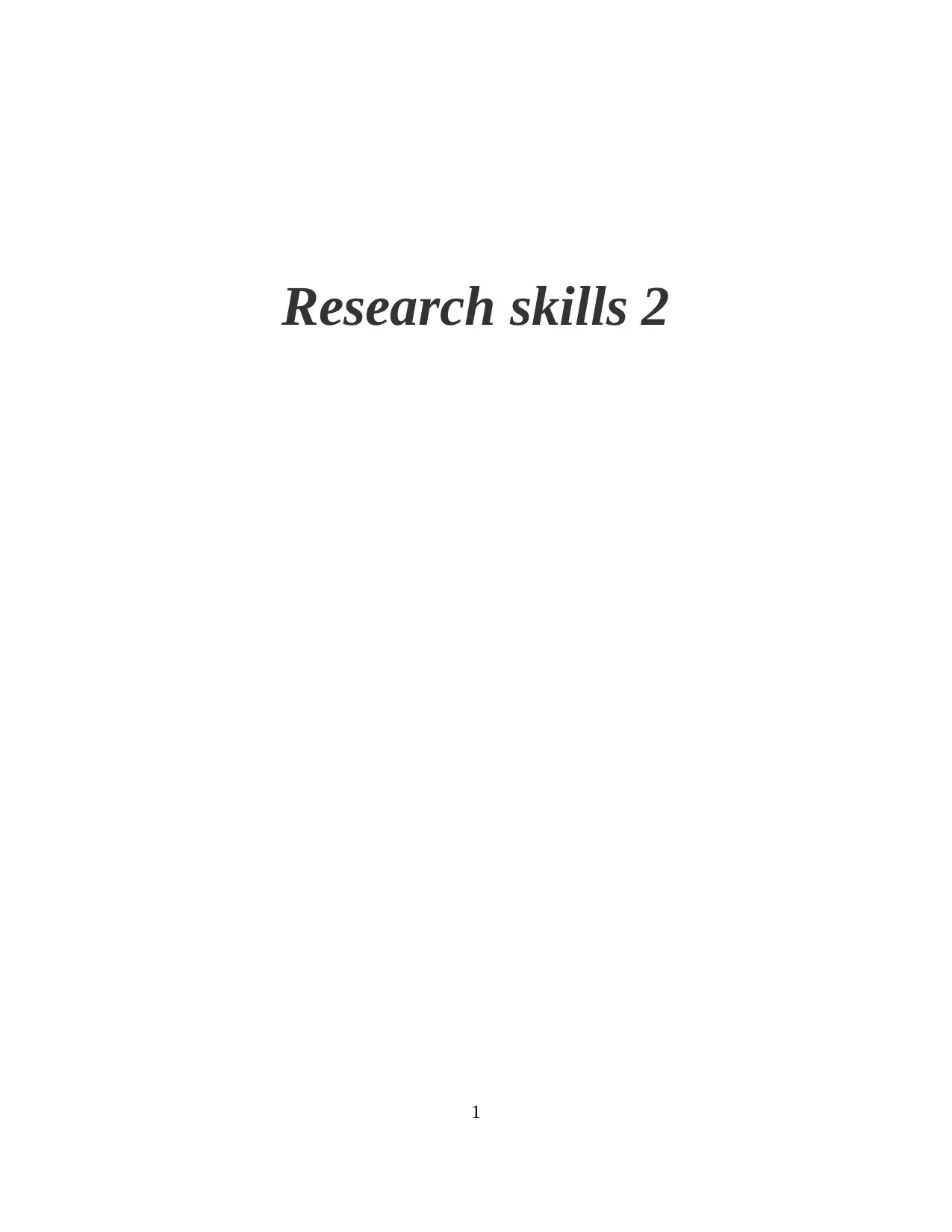
Research skills 2
1
1
Paraphrase This Document
Need a fresh take? Get an instant paraphrase of this document with our AI Paraphraser
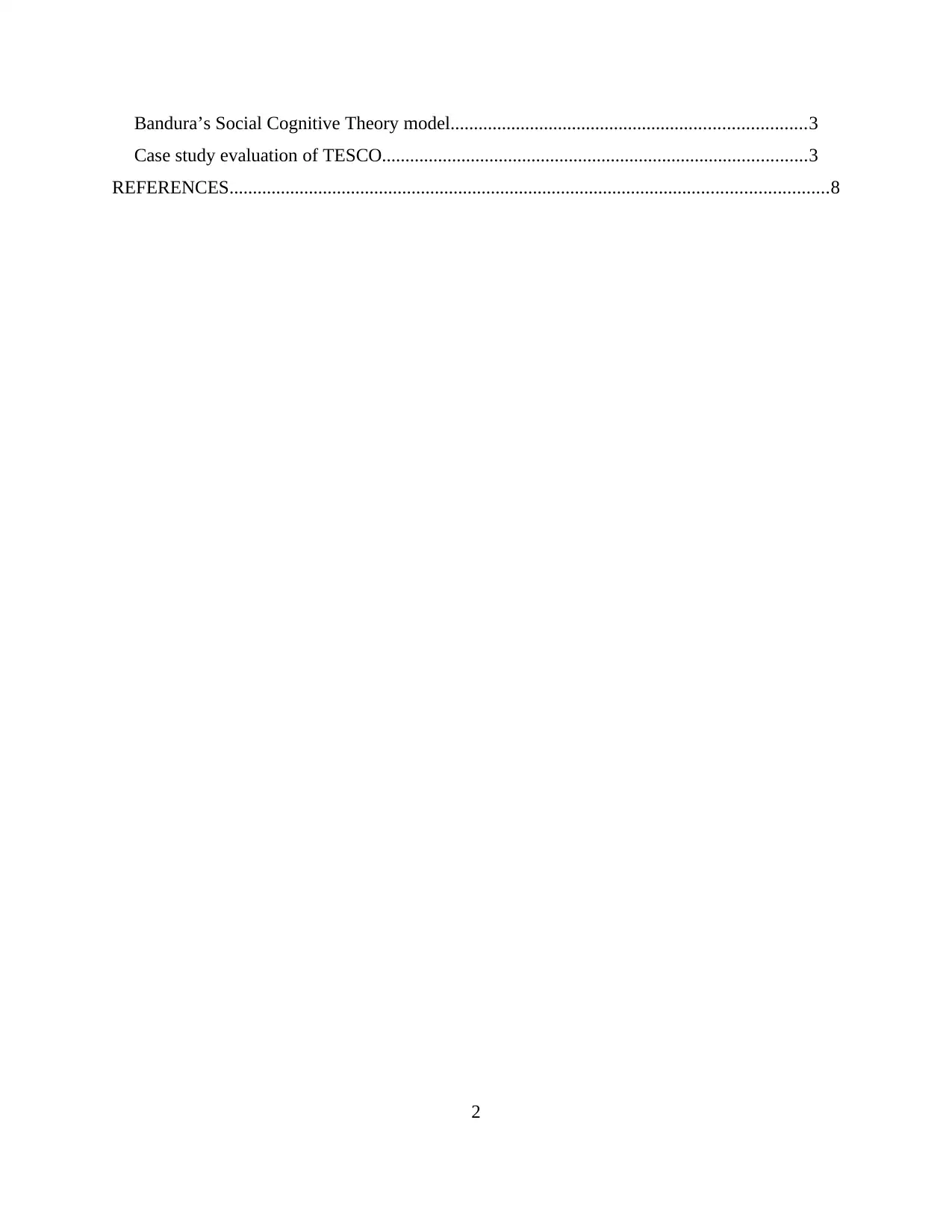
Bandura’s Social Cognitive Theory model............................................................................3
Case study evaluation of TESCO...........................................................................................3
REFERENCES................................................................................................................................8
2
Case study evaluation of TESCO...........................................................................................3
REFERENCES................................................................................................................................8
2
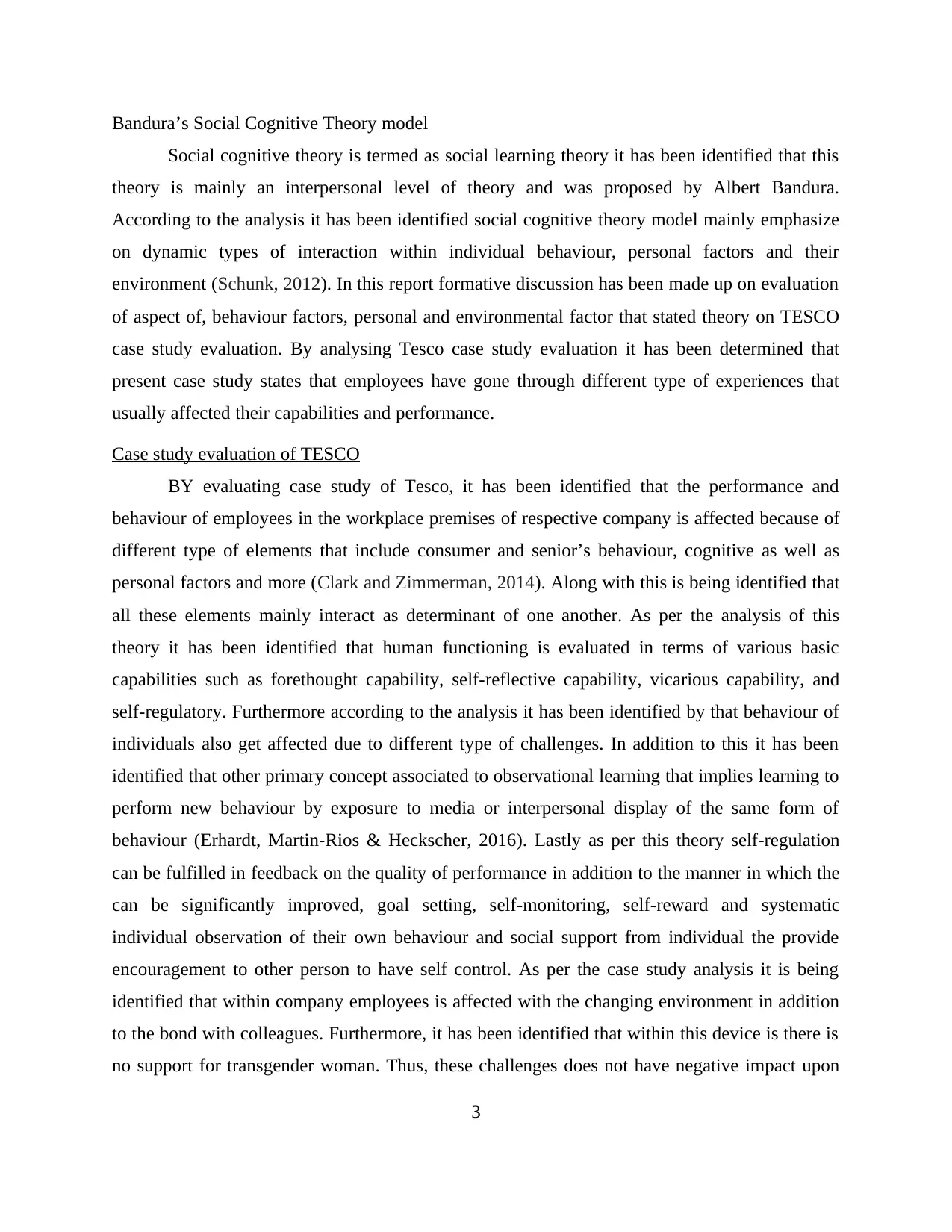
Bandura’s Social Cognitive Theory model
Social cognitive theory is termed as social learning theory it has been identified that this
theory is mainly an interpersonal level of theory and was proposed by Albert Bandura.
According to the analysis it has been identified social cognitive theory model mainly emphasize
on dynamic types of interaction within individual behaviour, personal factors and their
environment (Schunk, 2012). In this report formative discussion has been made up on evaluation
of aspect of, behaviour factors, personal and environmental factor that stated theory on TESCO
case study evaluation. By analysing Tesco case study evaluation it has been determined that
present case study states that employees have gone through different type of experiences that
usually affected their capabilities and performance.
Case study evaluation of TESCO
BY evaluating case study of Tesco, it has been identified that the performance and
behaviour of employees in the workplace premises of respective company is affected because of
different type of elements that include consumer and senior’s behaviour, cognitive as well as
personal factors and more (Clark and Zimmerman, 2014). Along with this is being identified that
all these elements mainly interact as determinant of one another. As per the analysis of this
theory it has been identified that human functioning is evaluated in terms of various basic
capabilities such as forethought capability, self-reflective capability, vicarious capability, and
self-regulatory. Furthermore according to the analysis it has been identified by that behaviour of
individuals also get affected due to different type of challenges. In addition to this it has been
identified that other primary concept associated to observational learning that implies learning to
perform new behaviour by exposure to media or interpersonal display of the same form of
behaviour (Erhardt, Martin-Rios & Heckscher, 2016). Lastly as per this theory self-regulation
can be fulfilled in feedback on the quality of performance in addition to the manner in which the
can be significantly improved, goal setting, self-monitoring, self-reward and systematic
individual observation of their own behaviour and social support from individual the provide
encouragement to other person to have self control. As per the case study analysis it is being
identified that within company employees is affected with the changing environment in addition
to the bond with colleagues. Furthermore, it has been identified that within this device is there is
no support for transgender woman. Thus, these challenges does not have negative impact upon
3
Social cognitive theory is termed as social learning theory it has been identified that this
theory is mainly an interpersonal level of theory and was proposed by Albert Bandura.
According to the analysis it has been identified social cognitive theory model mainly emphasize
on dynamic types of interaction within individual behaviour, personal factors and their
environment (Schunk, 2012). In this report formative discussion has been made up on evaluation
of aspect of, behaviour factors, personal and environmental factor that stated theory on TESCO
case study evaluation. By analysing Tesco case study evaluation it has been determined that
present case study states that employees have gone through different type of experiences that
usually affected their capabilities and performance.
Case study evaluation of TESCO
BY evaluating case study of Tesco, it has been identified that the performance and
behaviour of employees in the workplace premises of respective company is affected because of
different type of elements that include consumer and senior’s behaviour, cognitive as well as
personal factors and more (Clark and Zimmerman, 2014). Along with this is being identified that
all these elements mainly interact as determinant of one another. As per the analysis of this
theory it has been identified that human functioning is evaluated in terms of various basic
capabilities such as forethought capability, self-reflective capability, vicarious capability, and
self-regulatory. Furthermore according to the analysis it has been identified by that behaviour of
individuals also get affected due to different type of challenges. In addition to this it has been
identified that other primary concept associated to observational learning that implies learning to
perform new behaviour by exposure to media or interpersonal display of the same form of
behaviour (Erhardt, Martin-Rios & Heckscher, 2016). Lastly as per this theory self-regulation
can be fulfilled in feedback on the quality of performance in addition to the manner in which the
can be significantly improved, goal setting, self-monitoring, self-reward and systematic
individual observation of their own behaviour and social support from individual the provide
encouragement to other person to have self control. As per the case study analysis it is being
identified that within company employees is affected with the changing environment in addition
to the bond with colleagues. Furthermore, it has been identified that within this device is there is
no support for transgender woman. Thus, these challenges does not have negative impact upon
3
⊘ This is a preview!⊘
Do you want full access?
Subscribe today to unlock all pages.

Trusted by 1+ million students worldwide
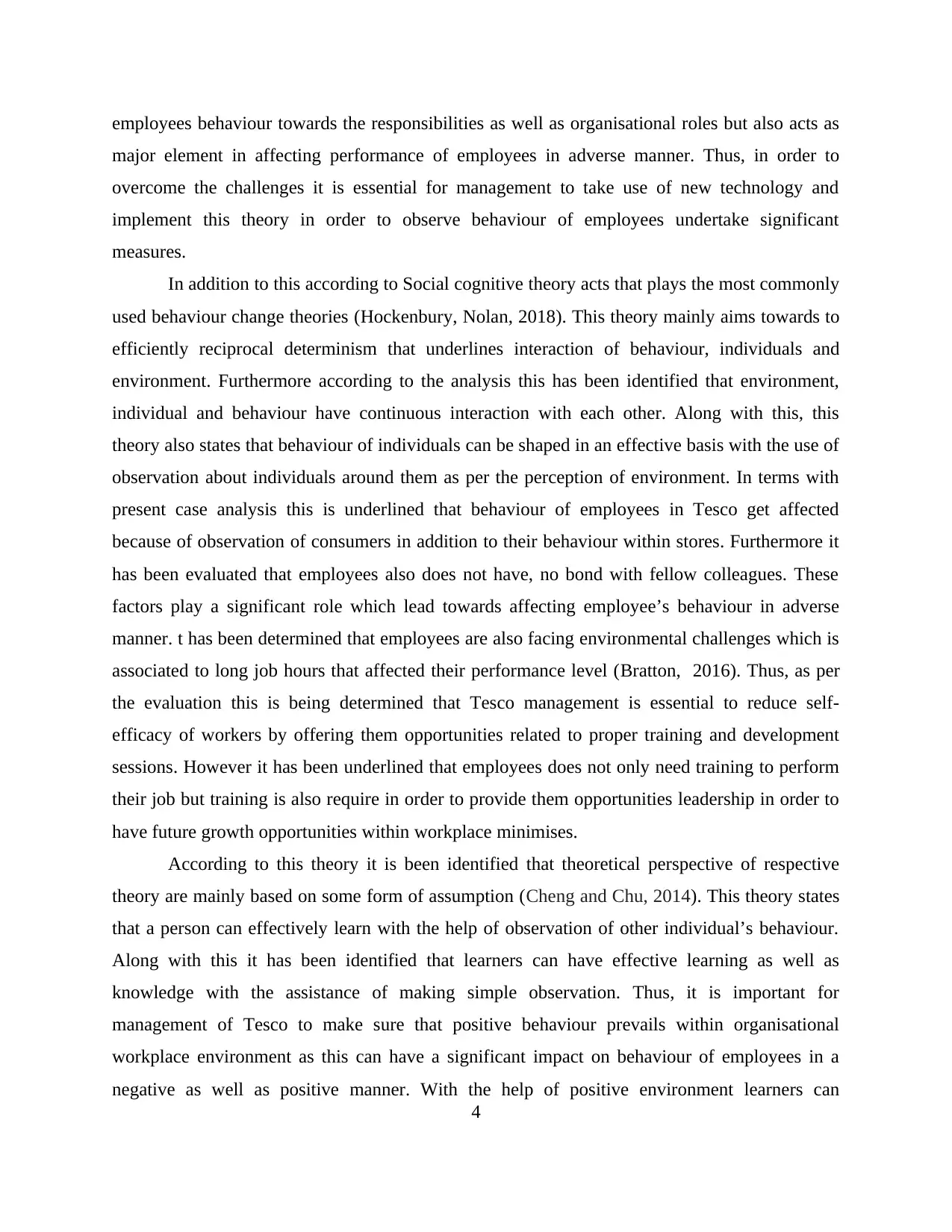
employees behaviour towards the responsibilities as well as organisational roles but also acts as
major element in affecting performance of employees in adverse manner. Thus, in order to
overcome the challenges it is essential for management to take use of new technology and
implement this theory in order to observe behaviour of employees undertake significant
measures.
In addition to this according to Social cognitive theory acts that plays the most commonly
used behaviour change theories (Hockenbury, Nolan, 2018). This theory mainly aims towards to
efficiently reciprocal determinism that underlines interaction of behaviour, individuals and
environment. Furthermore according to the analysis this has been identified that environment,
individual and behaviour have continuous interaction with each other. Along with this, this
theory also states that behaviour of individuals can be shaped in an effective basis with the use of
observation about individuals around them as per the perception of environment. In terms with
present case analysis this is underlined that behaviour of employees in Tesco get affected
because of observation of consumers in addition to their behaviour within stores. Furthermore it
has been evaluated that employees also does not have, no bond with fellow colleagues. These
factors play a significant role which lead towards affecting employee’s behaviour in adverse
manner. t has been determined that employees are also facing environmental challenges which is
associated to long job hours that affected their performance level (Bratton, 2016). Thus, as per
the evaluation this is being determined that Tesco management is essential to reduce self-
efficacy of workers by offering them opportunities related to proper training and development
sessions. However it has been underlined that employees does not only need training to perform
their job but training is also require in order to provide them opportunities leadership in order to
have future growth opportunities within workplace minimises.
According to this theory it is been identified that theoretical perspective of respective
theory are mainly based on some form of assumption (Cheng and Chu, 2014). This theory states
that a person can effectively learn with the help of observation of other individual’s behaviour.
Along with this it has been identified that learners can have effective learning as well as
knowledge with the assistance of making simple observation. Thus, it is important for
management of Tesco to make sure that positive behaviour prevails within organisational
workplace environment as this can have a significant impact on behaviour of employees in a
negative as well as positive manner. With the help of positive environment learners can
4
major element in affecting performance of employees in adverse manner. Thus, in order to
overcome the challenges it is essential for management to take use of new technology and
implement this theory in order to observe behaviour of employees undertake significant
measures.
In addition to this according to Social cognitive theory acts that plays the most commonly
used behaviour change theories (Hockenbury, Nolan, 2018). This theory mainly aims towards to
efficiently reciprocal determinism that underlines interaction of behaviour, individuals and
environment. Furthermore according to the analysis this has been identified that environment,
individual and behaviour have continuous interaction with each other. Along with this, this
theory also states that behaviour of individuals can be shaped in an effective basis with the use of
observation about individuals around them as per the perception of environment. In terms with
present case analysis this is underlined that behaviour of employees in Tesco get affected
because of observation of consumers in addition to their behaviour within stores. Furthermore it
has been evaluated that employees also does not have, no bond with fellow colleagues. These
factors play a significant role which lead towards affecting employee’s behaviour in adverse
manner. t has been determined that employees are also facing environmental challenges which is
associated to long job hours that affected their performance level (Bratton, 2016). Thus, as per
the evaluation this is being determined that Tesco management is essential to reduce self-
efficacy of workers by offering them opportunities related to proper training and development
sessions. However it has been underlined that employees does not only need training to perform
their job but training is also require in order to provide them opportunities leadership in order to
have future growth opportunities within workplace minimises.
According to this theory it is been identified that theoretical perspective of respective
theory are mainly based on some form of assumption (Cheng and Chu, 2014). This theory states
that a person can effectively learn with the help of observation of other individual’s behaviour.
Along with this it has been identified that learners can have effective learning as well as
knowledge with the assistance of making simple observation. Thus, it is important for
management of Tesco to make sure that positive behaviour prevails within organisational
workplace environment as this can have a significant impact on behaviour of employees in a
negative as well as positive manner. With the help of positive environment learners can
4
Paraphrase This Document
Need a fresh take? Get an instant paraphrase of this document with our AI Paraphraser
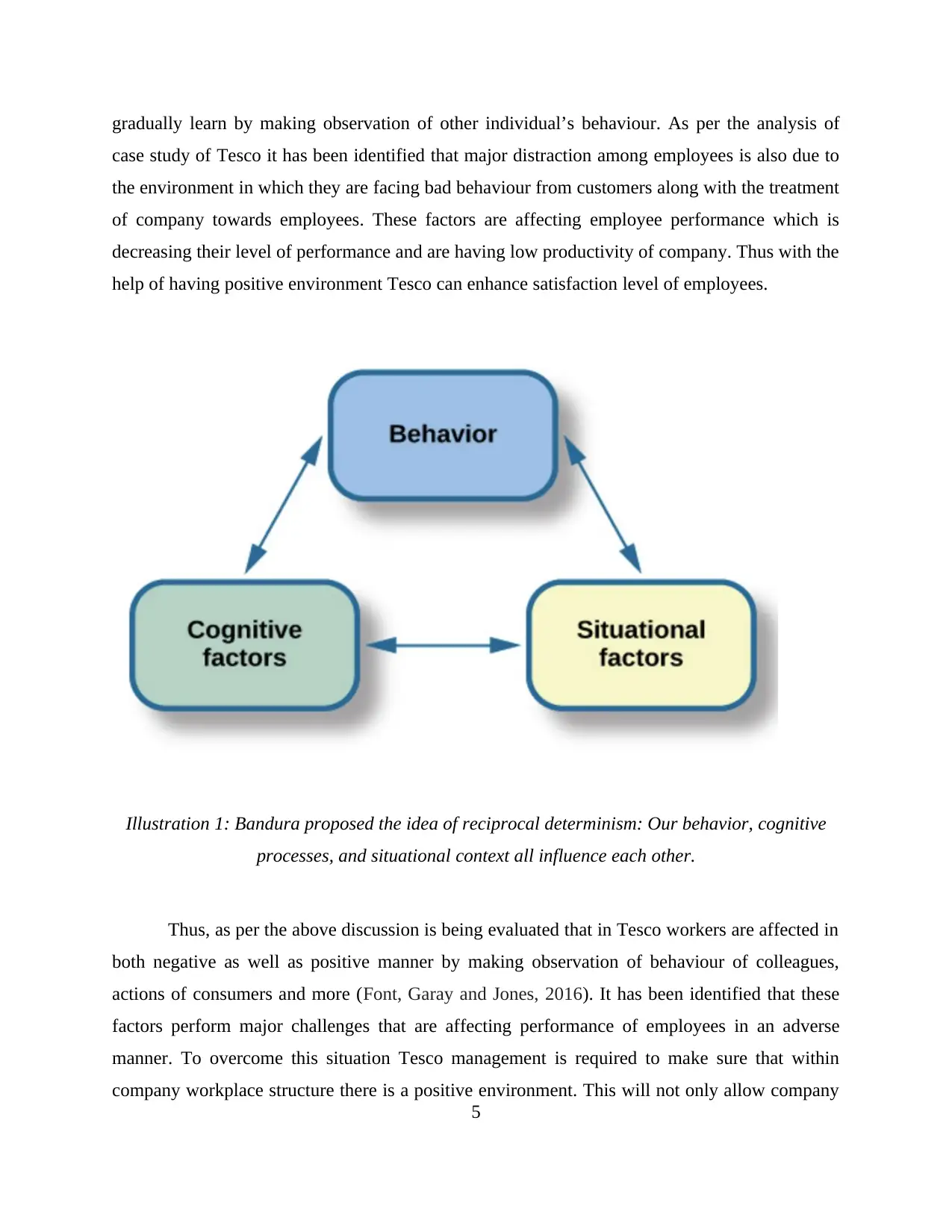
gradually learn by making observation of other individual’s behaviour. As per the analysis of
case study of Tesco it has been identified that major distraction among employees is also due to
the environment in which they are facing bad behaviour from customers along with the treatment
of company towards employees. These factors are affecting employee performance which is
decreasing their level of performance and are having low productivity of company. Thus with the
help of having positive environment Tesco can enhance satisfaction level of employees.
Illustration 1: Bandura proposed the idea of reciprocal determinism: Our behavior, cognitive
processes, and situational context all influence each other.
Thus, as per the above discussion is being evaluated that in Tesco workers are affected in
both negative as well as positive manner by making observation of behaviour of colleagues,
actions of consumers and more (Font, Garay and Jones, 2016). It has been identified that these
factors perform major challenges that are affecting performance of employees in an adverse
manner. To overcome this situation Tesco management is required to make sure that within
company workplace structure there is a positive environment. This will not only allow company
5
case study of Tesco it has been identified that major distraction among employees is also due to
the environment in which they are facing bad behaviour from customers along with the treatment
of company towards employees. These factors are affecting employee performance which is
decreasing their level of performance and are having low productivity of company. Thus with the
help of having positive environment Tesco can enhance satisfaction level of employees.
Illustration 1: Bandura proposed the idea of reciprocal determinism: Our behavior, cognitive
processes, and situational context all influence each other.
Thus, as per the above discussion is being evaluated that in Tesco workers are affected in
both negative as well as positive manner by making observation of behaviour of colleagues,
actions of consumers and more (Font, Garay and Jones, 2016). It has been identified that these
factors perform major challenges that are affecting performance of employees in an adverse
manner. To overcome this situation Tesco management is required to make sure that within
company workplace structure there is a positive environment. This will not only allow company
5
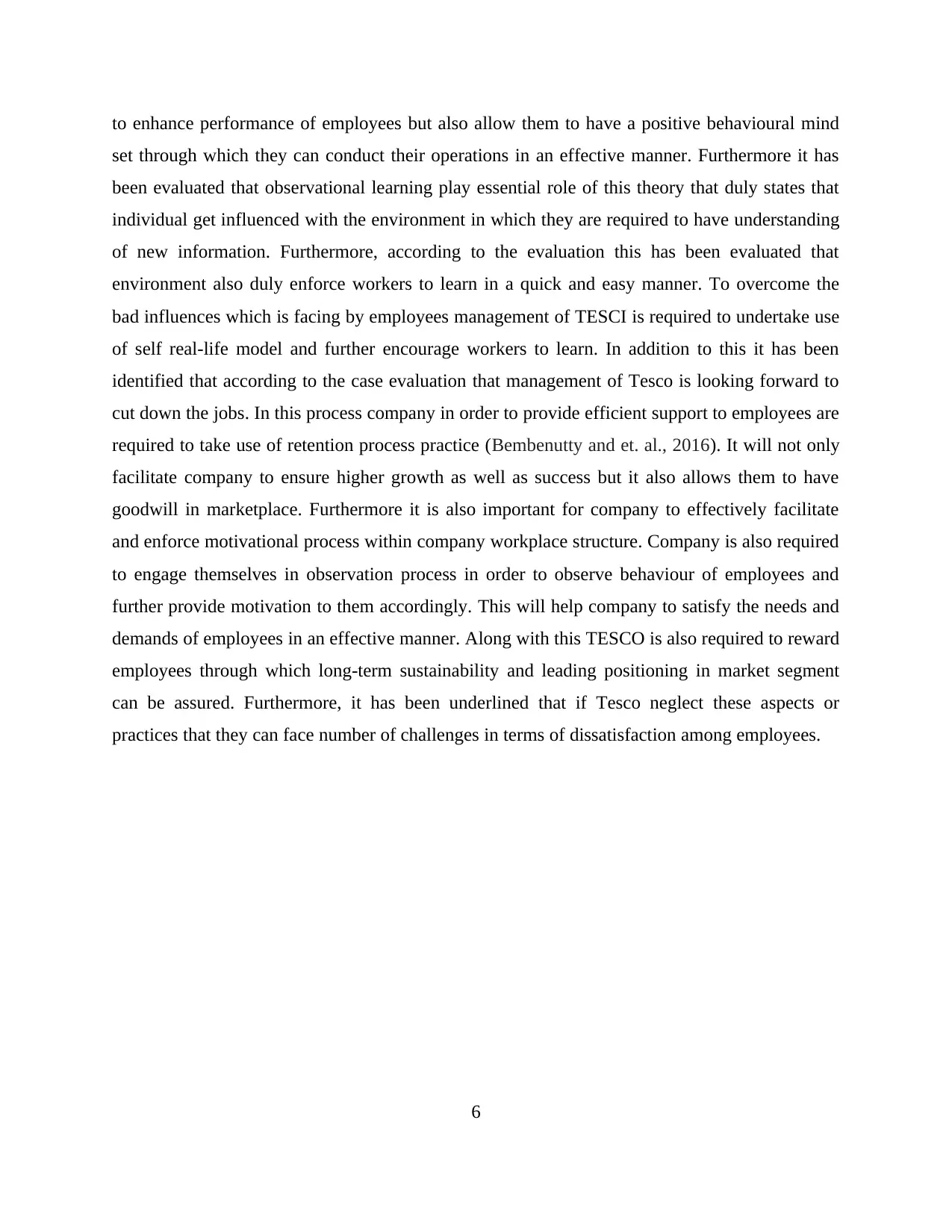
to enhance performance of employees but also allow them to have a positive behavioural mind
set through which they can conduct their operations in an effective manner. Furthermore it has
been evaluated that observational learning play essential role of this theory that duly states that
individual get influenced with the environment in which they are required to have understanding
of new information. Furthermore, according to the evaluation this has been evaluated that
environment also duly enforce workers to learn in a quick and easy manner. To overcome the
bad influences which is facing by employees management of TESCI is required to undertake use
of self real-life model and further encourage workers to learn. In addition to this it has been
identified that according to the case evaluation that management of Tesco is looking forward to
cut down the jobs. In this process company in order to provide efficient support to employees are
required to take use of retention process practice (Bembenutty and et. al., 2016). It will not only
facilitate company to ensure higher growth as well as success but it also allows them to have
goodwill in marketplace. Furthermore it is also important for company to effectively facilitate
and enforce motivational process within company workplace structure. Company is also required
to engage themselves in observation process in order to observe behaviour of employees and
further provide motivation to them accordingly. This will help company to satisfy the needs and
demands of employees in an effective manner. Along with this TESCO is also required to reward
employees through which long-term sustainability and leading positioning in market segment
can be assured. Furthermore, it has been underlined that if Tesco neglect these aspects or
practices that they can face number of challenges in terms of dissatisfaction among employees.
6
set through which they can conduct their operations in an effective manner. Furthermore it has
been evaluated that observational learning play essential role of this theory that duly states that
individual get influenced with the environment in which they are required to have understanding
of new information. Furthermore, according to the evaluation this has been evaluated that
environment also duly enforce workers to learn in a quick and easy manner. To overcome the
bad influences which is facing by employees management of TESCI is required to undertake use
of self real-life model and further encourage workers to learn. In addition to this it has been
identified that according to the case evaluation that management of Tesco is looking forward to
cut down the jobs. In this process company in order to provide efficient support to employees are
required to take use of retention process practice (Bembenutty and et. al., 2016). It will not only
facilitate company to ensure higher growth as well as success but it also allows them to have
goodwill in marketplace. Furthermore it is also important for company to effectively facilitate
and enforce motivational process within company workplace structure. Company is also required
to engage themselves in observation process in order to observe behaviour of employees and
further provide motivation to them accordingly. This will help company to satisfy the needs and
demands of employees in an effective manner. Along with this TESCO is also required to reward
employees through which long-term sustainability and leading positioning in market segment
can be assured. Furthermore, it has been underlined that if Tesco neglect these aspects or
practices that they can face number of challenges in terms of dissatisfaction among employees.
6
⊘ This is a preview!⊘
Do you want full access?
Subscribe today to unlock all pages.

Trusted by 1+ million students worldwide
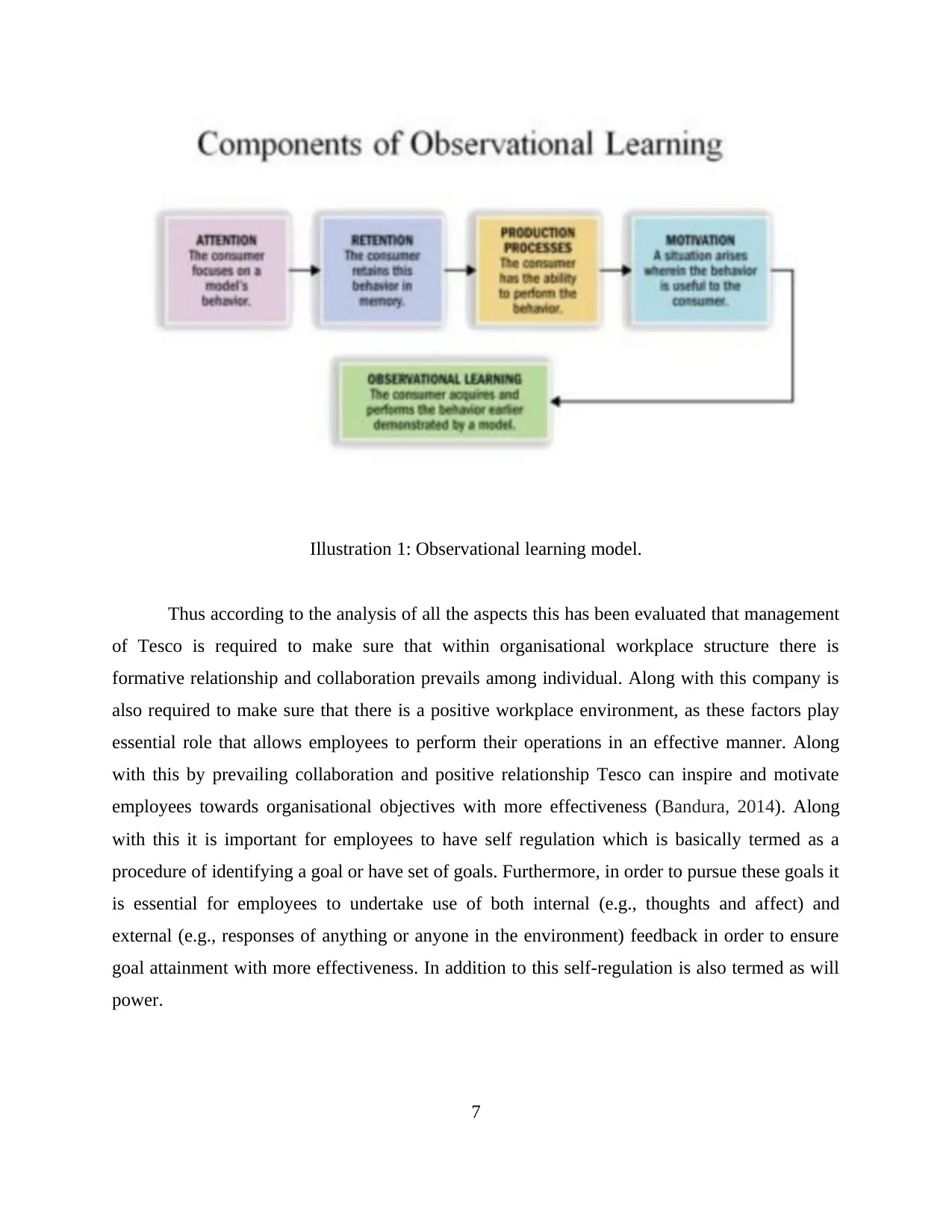
Illustration 1: Observational learning model.
Thus according to the analysis of all the aspects this has been evaluated that management
of Tesco is required to make sure that within organisational workplace structure there is
formative relationship and collaboration prevails among individual. Along with this company is
also required to make sure that there is a positive workplace environment, as these factors play
essential role that allows employees to perform their operations in an effective manner. Along
with this by prevailing collaboration and positive relationship Tesco can inspire and motivate
employees towards organisational objectives with more effectiveness (Bandura, 2014). Along
with this it is important for employees to have self regulation which is basically termed as a
procedure of identifying a goal or have set of goals. Furthermore, in order to pursue these goals it
is essential for employees to undertake use of both internal (e.g., thoughts and affect) and
external (e.g., responses of anything or anyone in the environment) feedback in order to ensure
goal attainment with more effectiveness. In addition to this self-regulation is also termed as will
power.
7
Thus according to the analysis of all the aspects this has been evaluated that management
of Tesco is required to make sure that within organisational workplace structure there is
formative relationship and collaboration prevails among individual. Along with this company is
also required to make sure that there is a positive workplace environment, as these factors play
essential role that allows employees to perform their operations in an effective manner. Along
with this by prevailing collaboration and positive relationship Tesco can inspire and motivate
employees towards organisational objectives with more effectiveness (Bandura, 2014). Along
with this it is important for employees to have self regulation which is basically termed as a
procedure of identifying a goal or have set of goals. Furthermore, in order to pursue these goals it
is essential for employees to undertake use of both internal (e.g., thoughts and affect) and
external (e.g., responses of anything or anyone in the environment) feedback in order to ensure
goal attainment with more effectiveness. In addition to this self-regulation is also termed as will
power.
7
Paraphrase This Document
Need a fresh take? Get an instant paraphrase of this document with our AI Paraphraser
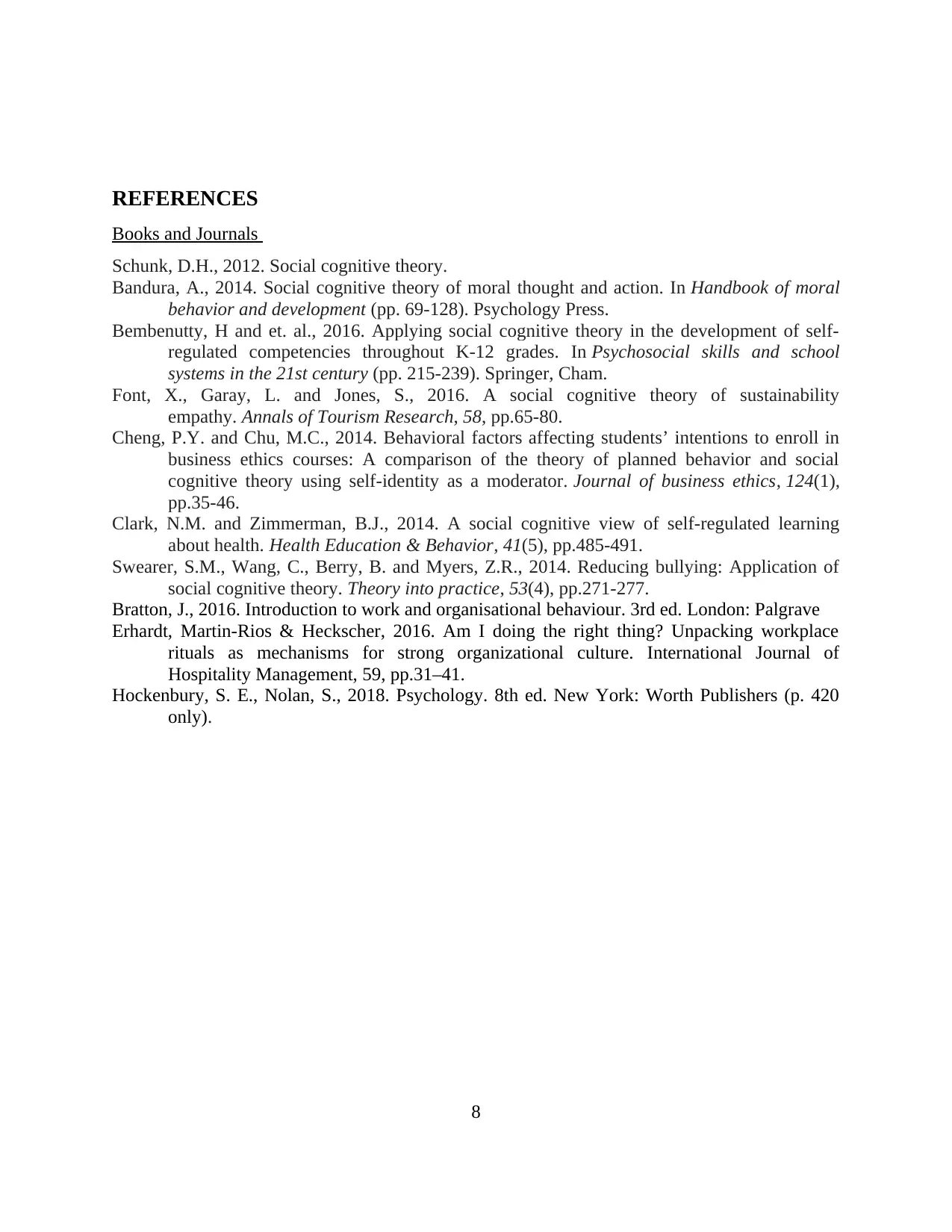
REFERENCES
Books and Journals
Schunk, D.H., 2012. Social cognitive theory.
Bandura, A., 2014. Social cognitive theory of moral thought and action. In Handbook of moral
behavior and development (pp. 69-128). Psychology Press.
Bembenutty, H and et. al., 2016. Applying social cognitive theory in the development of self-
regulated competencies throughout K-12 grades. In Psychosocial skills and school
systems in the 21st century (pp. 215-239). Springer, Cham.
Font, X., Garay, L. and Jones, S., 2016. A social cognitive theory of sustainability
empathy. Annals of Tourism Research, 58, pp.65-80.
Cheng, P.Y. and Chu, M.C., 2014. Behavioral factors affecting students’ intentions to enroll in
business ethics courses: A comparison of the theory of planned behavior and social
cognitive theory using self-identity as a moderator. Journal of business ethics, 124(1),
pp.35-46.
Clark, N.M. and Zimmerman, B.J., 2014. A social cognitive view of self-regulated learning
about health. Health Education & Behavior, 41(5), pp.485-491.
Swearer, S.M., Wang, C., Berry, B. and Myers, Z.R., 2014. Reducing bullying: Application of
social cognitive theory. Theory into practice, 53(4), pp.271-277.
Bratton, J., 2016. Introduction to work and organisational behaviour. 3rd ed. London: Palgrave
Erhardt, Martin-Rios & Heckscher, 2016. Am I doing the right thing? Unpacking workplace
rituals as mechanisms for strong organizational culture. International Journal of
Hospitality Management, 59, pp.31–41.
Hockenbury, S. E., Nolan, S., 2018. Psychology. 8th ed. New York: Worth Publishers (p. 420
only).
8
Books and Journals
Schunk, D.H., 2012. Social cognitive theory.
Bandura, A., 2014. Social cognitive theory of moral thought and action. In Handbook of moral
behavior and development (pp. 69-128). Psychology Press.
Bembenutty, H and et. al., 2016. Applying social cognitive theory in the development of self-
regulated competencies throughout K-12 grades. In Psychosocial skills and school
systems in the 21st century (pp. 215-239). Springer, Cham.
Font, X., Garay, L. and Jones, S., 2016. A social cognitive theory of sustainability
empathy. Annals of Tourism Research, 58, pp.65-80.
Cheng, P.Y. and Chu, M.C., 2014. Behavioral factors affecting students’ intentions to enroll in
business ethics courses: A comparison of the theory of planned behavior and social
cognitive theory using self-identity as a moderator. Journal of business ethics, 124(1),
pp.35-46.
Clark, N.M. and Zimmerman, B.J., 2014. A social cognitive view of self-regulated learning
about health. Health Education & Behavior, 41(5), pp.485-491.
Swearer, S.M., Wang, C., Berry, B. and Myers, Z.R., 2014. Reducing bullying: Application of
social cognitive theory. Theory into practice, 53(4), pp.271-277.
Bratton, J., 2016. Introduction to work and organisational behaviour. 3rd ed. London: Palgrave
Erhardt, Martin-Rios & Heckscher, 2016. Am I doing the right thing? Unpacking workplace
rituals as mechanisms for strong organizational culture. International Journal of
Hospitality Management, 59, pp.31–41.
Hockenbury, S. E., Nolan, S., 2018. Psychology. 8th ed. New York: Worth Publishers (p. 420
only).
8
1 out of 8
Related Documents
Your All-in-One AI-Powered Toolkit for Academic Success.
+13062052269
info@desklib.com
Available 24*7 on WhatsApp / Email
![[object Object]](/_next/static/media/star-bottom.7253800d.svg)
Unlock your academic potential
Copyright © 2020–2026 A2Z Services. All Rights Reserved. Developed and managed by ZUCOL.





